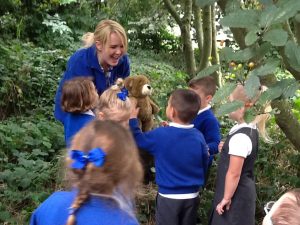Outdoor Learning at St. Andrew’s Primary School, Co. Durham. a guest post by Nicola James Headteacher
Why?
At the end of each term we collate and analyse our behaviour records to find out who the key pupils are for support. Each term the same names appear in the “concern” list and each term we wonder what can we do for these children and what are we not doing for these children that they need?
This year we have had an epiphany! As we talked about these children, (100% are boys) we realised that their life outside of school would normally be spent outdoors; playing in the woods, seeing to the horses in the fields, riding bikes in the streets etc. It suddenly occurred to us that we were caging these boys- just like caged animals. They spend a lot of time outdoors yet we wonder why, when we pen them into a classroom, expecting them to sit for a whole lesson, they can’t cope and their behaviour worsens. So, we decided to change how we teach to support these children. What we have done has been simple to implement but the results are astounding!
What did we do?
We started the academic year with an INSET day exploring the theory behind Outdoor Learning. We explored our school grounds and looked for opportunities for learning and went on a whole staff ramble around the local area to see what was available to us on our doorstep. This got staff thinking and talking about the possibilities. The staff were set a task to plan, teach and review a lesson taught outside and “show and tell” their findings three weeks later in a staff meeting. Teaching assistants were assigned one child, from the “concern” list, each to observe during a classroom based lesson and then during an outdoor lesson and report their findings in the staff meeting. The staff took on the task with gusto.
What were the results?
At the “show and tell” staff meeting, staff came adorned with plans, children’s work, photo’s PowerPoints and scrapbooks. Each year group took turns explaining their lessons and findings. What was remarkable was the enthusiasm of the staff – they were animated, motivated and excited to share what they had done. There was a real positive vibe to the meeting.
What was the most telling were the observations of our key pupils. Teaching assistants were asked to identify words that best described their pupil during the indoor and outdoor lessons. The results were astounding.
Some examples of the observations are:
Pupil 1:Y6
Indoors: passive, shy, disruptive, lazy, lethargic and bored
Outdoors: enthusiastic, excitable, active, creative, curious, attentive, ambitious, hard working
Pupil 2: Y2
Indoors: lethargic, grumpy, reserved, bored, cheeky
Outdoors: curious, funny, loud, enthusiastic, animated
Pupil 3:Y3
Indoors: moody, rude, grumpy, bored, bad tempered, disruptive
Outdoors: active, creative, loud, funny, co-operative, team player, curious
Initial analysis of our behaviour records for September show a significant reduction in key pupils moving up our “Behaviour Triangle.”
The results speak for themselves. The staff were convinced it was the right move for our children.
What next?
Staff have committed to planning and teaching at least one outdoor lesson a week. However, it’s been difficult for them to keep to the minimum – they’re out nearly every day.
During October and November we start each staff meeting with a “Sharing good practice” session, where one year group per week tells everyone about an outdoor learning success story. During these sessions we talk about barriers we encounter and come up with solutions to them.
Throughout the Autumn Term, we have invited parents to join in with the outdoor learning with den building afternoons, dads and sons day- clearing brambles and nettles and a charity treasure hunt around the school grounds. Staff share photos with parents, of the children learning outdoors via our school messaging system. The majority of our school trips have had an outdoor focus.
In the Spring term we have planned another INSET day around outdoor learning but looking at how we can use this to improve writing across the curriculum as identified in our SIP.
Subject co-ordinators are looking at ways to bring outdoor learning alive in their curriculum areas and will share with staff in staff meetings, beginning with the core subjects.
The future?
The sky’s the limit!
Nicola




